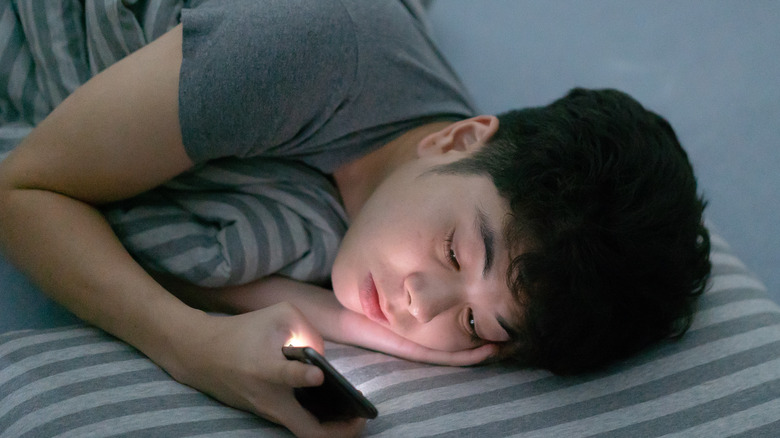Research Reveals Surprising Side Effects For Teens Who Don't Get Enough Sleep
Sleep is of critical importance to those entering their teenage years. According to the Sleep Foundation, adolescents are encouraged to get between eight and 10 hours of sleep each night. Teens who get adequate amounts of sleep often experience increases in focus, learning consolidation, emotional well-being, and more. However, science shows that many teens are not spending enough time snoozing.
The Sleep Foundation has identified a number of possible contributing factors as to why adolescents aren't getting adequate amounts of rest. Such factors include the presence of certain mental health disorders, an overload of school-related tasks, or frequent electronic use. In fact, poll results from a survey issued by the Sleep Foundation found that nearly 90% of teenagers sleep with their phones nearby.
A lack of proper sleep can wreak havoc on our health. Now, new research presented at the 2022 European Society of Cardiology Congress reveals a link between insufficient sleep and obesity risk in young people. Researchers from the study tracked 1,229 adolescent students in Spain as they aged throughout their teenage years. Starting at age 12, researchers collected data related to each student's physical health and sleep quality over the course of a week. Data was collected again when participants reached 14 years of age and again at 16.
Insufficient sleep and increased obesity risk in teens
As per the study, teens who received fewer than seven hours of sleep nightly were classified as "very short sleepers." "Short sleepers" were defined as those who slept seven to eight hours per night. Students who got eight or more hours of sleep each night were termed "optimal."
Findings showed that the hours of sleep teens received each night decreased as they aged, while rates of obesity and overweight occurrence simultaneously increased. According to WebMD, 34% of 12-year-old participants reported receiving eight hours or more of sleep per night, with a prevalence rate of obesity standing at 21%. At age 14, only 23% of participants were receiving eight or more hours of sleep nightly, with the prevalence rate of obesity rising by 3% to 24%. Rates of sufficient sleep dropped further to 19% amongst 16-year-old participants, while prevalence rates of obesity were at their highest at 27%.
As reported via ScienceDaily, study author Mr. Jesús Martínez Gómez commented on the potential implications of their findings. "Excess weight and metabolic syndrome are ultimately associated with cardiovascular diseases, suggesting that health promotion programs in schools should teach good sleep habits," said Mr. Martínez Gómez (via ScienceDaily). "Parents can set a good example by having a consistent bedtime and limiting screen time in the evening. Public policies are also needed to tackle this global health problem."


